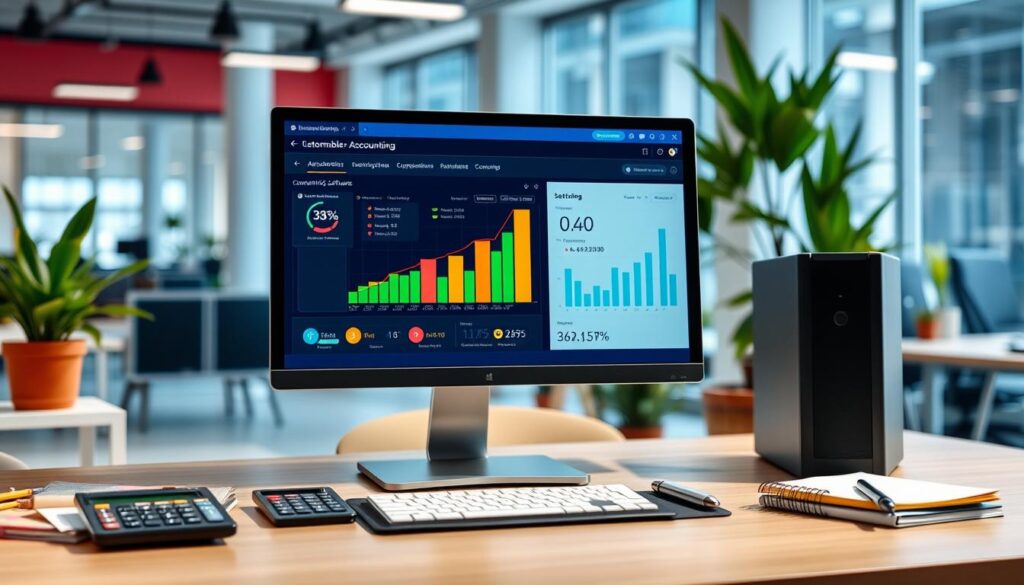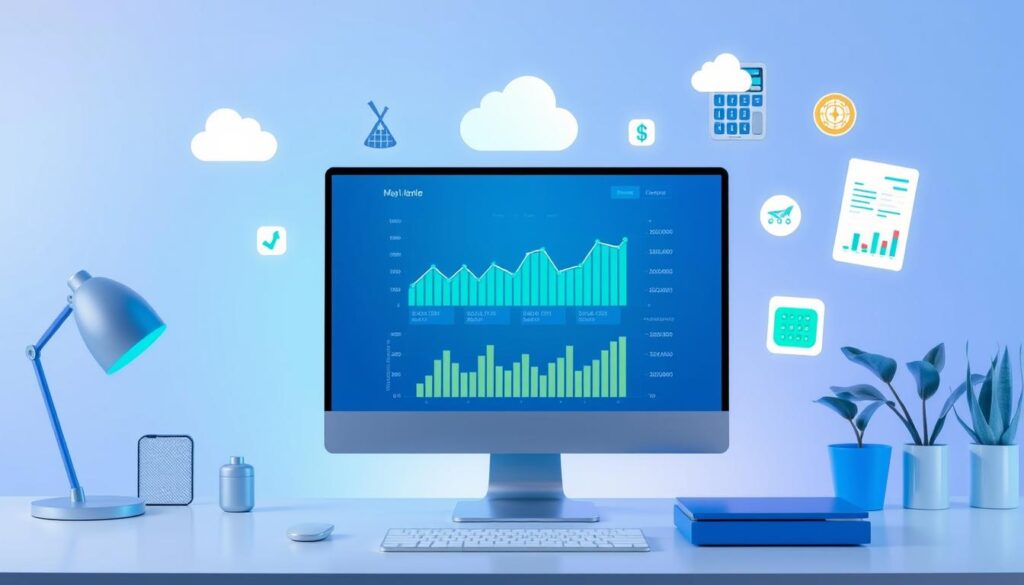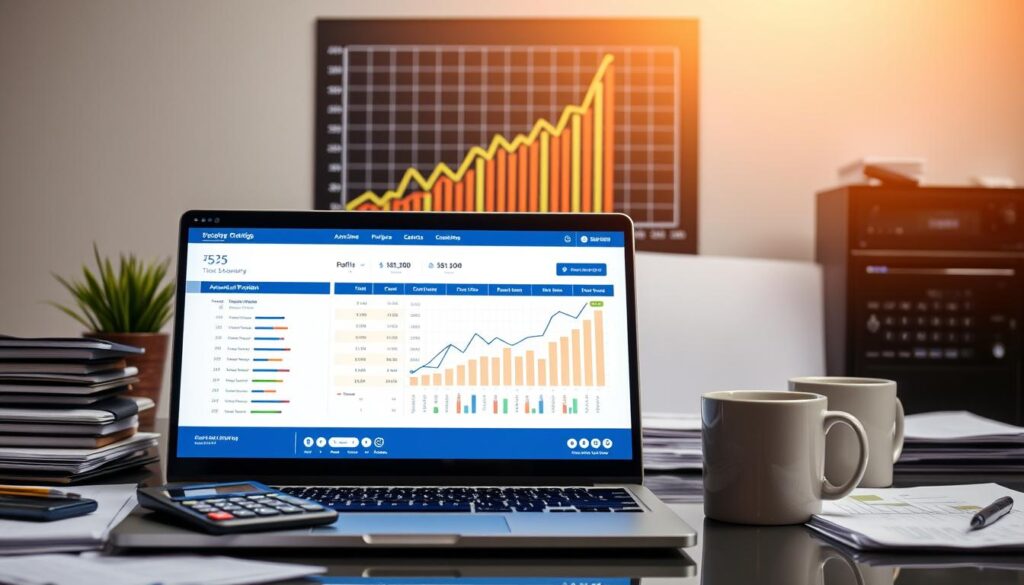In today’s fast-paced business environment, small business owners face numerous challenges, from managing cash flow to ensuring compliance with ever-changing tax regulations. Thankfully, the advent of technology has provided a solution that can significantly ease these burdens: accounting software. The benefits of accounting software for small businesses are profound, offering tools that not only simplify the intricacies of financial management but also enhance decision-making for small business owners.
By automating routine processes, this software allows entrepreneurs to focus their energy on growth and innovation, while also streamlining tax preparation to minimize headaches come filing season. In this article, we will explore the small business accounting software advantages that can help you take control of your financial journey, paving the way for success in an increasingly competitive landscape.
Switching from simple spreadsheets to small business accounting software is a big step for many entrepreneurs. As a business grows, managing finances well becomes even more important. Specialized software helps a lot, making tasks like invoicing and payroll easier.
Tools like Quickbooks, Wave, and Xero help keep finances in order. They make it easier to handle money matters, thanks to Zeni’s expertise. This makes managing money tasks more precise and professional.
Table of Contents
Key Takeaways
- 92% of SMBs report better financial organization post software adoption.
- Reduction in manual bookkeeping errors by up to 80%, thanks to automation.
- Enhanced cash flow efficiency by 40% through comprehensive invoicing systems.
- Significant 50% boost in decision-making precision with robust reporting tools.
- Over three-quarters of SMBs uphold accounting standards compliance with software.
- Audit readiness and lease expense management improve with dedicated tools.
- Substantial gains in productivity and weekly time savings for small businesses.
Transitioning from Spreadsheets to Specialized Software
As businesses grow, spreadsheets become less useful. Moving to specialized accounting software helps a lot. It makes operations smoother, more scalable, secure, and functional.
The Growth Challenge: When Spreadsheets Fall Short
Many start with Excel because it’s easy to use. But as businesses get bigger, they need something better. Excel is cheap and can be customized, but it’s hard to scale and often has errors, with 88% of spreadsheets having mistakes.
Embracing Artificial Intelligence in Modern Accounting
AI in accounting software goes beyond what spreadsheets can do. It makes data more accurate and provides insights. QuickBooks and Xero use AI to make transactions automatic and catch errors, a big step up from manual entry.
Customization and Convenience with Accounting Software
Today’s accounting software can be tailored to fit your business needs. It uses APIs and modular setups for customization. This ensures financial data is accurate and up-to-date across all platforms.
“68% of businesses faced data discrepancies during the spreadsheet to software transition without professional help.”
This software also grows with your business. It handles big data without slowing down, unlike spreadsheets.

| Feature | Excel | Accounting Software |
|---|---|---|
| Data Analysis | Limited by user skill and data size | Advanced analytics with real-time insights |
| Error Rate | High | Significantly reduced with automation |
| Integration | Minimal | Extensive with other business systems |
| Scalability | Limited | High, grows with business needs |
| Security | Minimal, prone to fraud | Robust, with audit trails and compliance features |
This change brings in new tech and improves how finances are managed. It helps businesses run more efficiently and securely.
Time-Saving Automations in Accounting Processes
Technology is changing how businesses handle money. Automated bookkeeping and better financial data management make things more efficient and accurate. This is true for big companies and small ones alike.

Automated systems in accounting save people from boring tasks. For example, automating expense tracking means no more manual entry. This saves a lot of time and cuts down on mistakes.
Reducing the Burden of Manual Bookkeeping
Efficiency is key in business today. Automated bookkeeping systems are a must-have. They make managing money easier, helping with cash flow and making better decisions.
Automating payroll has changed how companies handle money. It makes things simpler and less prone to mistakes.
Streamlining Financial Data Entry and Management
Accounting software now includes time-saving features. These help with the end of the month and welcoming new clients. For example, automated reminders and updates make communication and task management easier.
The journey started in the 1880s with William Burroughs’ adding machine. Now, we have systems that can do thousands of tasks in seconds. This reduces errors and adds predictive analytics for better planning.
As businesses grow, they need to adopt automated accounting. It’s not just a choice; it’s a must for effective financial management. These tools save time and let teams focus on strategy, leading to more success and growth.
Cost Savings with Accounting Software
Using accounting software boosts efficiency and saves money. It automates key tasks, helping small businesses cut costs. Let’s explore the direct and indirect savings these systems offer.
Understanding the Direct and Indirect Cost Benefits
Direct savings come from automating tasks like data entry. This reduces the need for manual work, saving on payroll. It’s a quick way to see cost savings.
Also, accounting software cuts down on storage and office needs. This lowers rental costs. The impact on financial efficiency is huge, affecting daily operations and planning.
Indirect benefits help in the long run. Automated systems reduce errors, saving time and money. They also improve financial reports, leading to better decision-making and resource use.
| Benefit | Direct Savings | Indirect Savings |
|---|---|---|
| Labor Costs | Reduction in manual data entry tasks | Lower long-term employment costs |
| Operational Expenses | Decreased need for office space | Reduced utility and maintenance costs |
| Error Management | Fewer financial discrepancies | Costs saved from non-compliance penalties |
| Strategic Decision Making | Time saved in report preparation | Better resource allocation and budget management |
Switching to software from companies like Intuit, Microsoft, SAP, and Oracle changes a business’s finances. It makes accounting smoother and raises the bar for growth and financial health.

Improved Accuracy in Financial Reporting
Small businesses always look for ways to make their financial reports better. They want to be more accurate and avoid mistakes. Modern accounting software helps a lot by automating important tasks and cutting down on errors.
Switching to advanced accounting platforms makes financial statements much more accurate. This is because there are fewer chances of mistakes like double entries, typos, or missing data. These errors are common in manual bookkeeping.
- Accounting software standardizes processes and formulas, reducing discrepancies.
- Automated report scheduling ensures the timely delivery of financial statements, crucial for accurate forecasting and decision-making.
- Built-in tax reports for sales and payroll ease the burdensome task of tax return preparations.
Modern accounting software is designed to meet the specific needs of different businesses. It helps with better financial management and makes it easier to make strategic decisions.
| Feature | Software | Benefit |
|---|---|---|
| Custom Reports | Zoho Books | Enables income tracking by specific criteria like sales representatives or locations. |
| Cash Management Tools | NetSuite | Facilitates real-time what-if analyses and forecasts cash trends. |
| Access Controls | FreshBooks | Improves precision through specific roles and permissions for software access. |
Case studies show how important accurate financial reporting is. For example, a local restaurant chain increased its profit margin by 8% in just six months. A digital marketing agency also saw a 25% profit boost through better financial planning.
For small businesses to grow and stay efficient, investing in good accounting software is essential. It’s not just a choice; it’s a must for success.
Access to Real-Time Financial Insights
Using the latest accounting software helps small businesses get real-time financial insights. This makes decision-making and planning better. It gives a clear view of a company’s financial health, making things more efficient.
Interpreting Financial Health with Live Data
Real-time financial insights are key to daily business operations. Tools like QuickBooks Online and Xero update financial data fast. They track cash flow, expenses, and revenue trends.
This helps in quick financial health checks. It also gives leaders the data for forecasting and managing risks.
Implementing Proactive Business Strategies
With live financial data, businesses can move from reacting to acting. They can spot financial trends early. This lets leaders plan and take steps to avoid financial issues.
Cloud-based platforms make teamwork better. They keep everyone on the same page with the latest data.
Modern accounting software offers many tools for proactive strategies. It automates tasks like data entry and report generation. This saves time for more important tasks.
Features like alerts for overdue payments and real-time budget checks keep finances in order. This way, businesses can grow and stay efficient.
Using real-time financial insights and proactive strategies helps businesses grow. They can adapt to market changes and improve their finances.
Benefits of Accounting Software for Small Businesses
Accounting software has a big impact on small businesses. Most owners say it makes their finances easier to manage. It helps them make better decisions with tools for automated invoicing and billing and streamlined tax preparation.
Studies show online accounting software improves businesses a lot. It makes data entry faster and financial management better. Many small businesses now use cloud-based solutions for more productivity and lower costs.
| Feature | Benefit to Small Business | Statistic |
|---|---|---|
| Cloud-Based Technology | Increased efficiency and accessibility | Number of businesses investing in cloud-based software grows annually |
| Automated Invoicing & Billing | Reduces manual errors and time spent on financial tasks | High percentage of businesses report time savings and error reduction |
| Streamlined Tax Preparation | Simplifies tax compliance and reporting | Significant reduction in tax preparation time for businesses |
| Centralized Financial Management | Enhanced decision-making through consolidated data | Businesses report better financial insights and decision-making ability |
Access to current financial reports helps owners make quick decisions. This lets them respond fast to market changes or internal shifts. Also, combining financial tasks on one platform reduces errors and strengthens the business’s financial health.
Modern accounting software is key for small businesses. It helps them handle financial management better. By integrating financial tasks digitally, owners can focus more on growing their business.
Automated Invoicing and Efficient Billing Management
Small businesses can greatly benefit from switching to automatic invoicing. This change brings efficiency and accuracy to their financial tasks. QuickBooks Online is a great example of how technology can make financial tasks easier and more reliable.
Cloud-based solutions like Wave and FreshBooks make efficient billing management affordable for small businesses. These platforms do more than just send invoices. They handle everything from payment reconciliation to expense tracking and financial reports.
The Advantage of Automatic Invoice Generation
Automatic invoice generation is a big win for small businesses. Tools like Zoho Books and Invoice Crowd make creating invoices much faster. This saves time and makes customers happier by sending accurate bills on time. Features like batch invoicing are great for businesses that send out a lot of invoices.
Streamlined Payment Reconciliation
Improving payment reconciliation can help a business’s cash flow and reduce late payments. Software like Sage 50 and QuickBooks makes it easy to match payments with invoices. They also have easy-to-use dashboards for tracking all financial activities.
Using automatic invoicing and efficient billing management systems is key for businesses looking to improve their finances. These tools not only make operations smoother but also help businesses grow and stay financially healthy. By adopting these technologies, small businesses can lead the way in financial management.
Streamline Tax Preparation with Intuitive Features
For small businesses and freelancers, tax season is a big challenge. They need to report their finances accurately and follow tax laws. Advanced accounting software like Outright makes this easier. It helps with tax preparation and ensures compliance through automated reports.
Simplifying Tax Compliance Procedure
Keeping accurate tax records is key for businesses to avoid legal and financial problems. Outright Accounting Software helps a lot with this. It automates tax calculations and connects with banks, keeping all financial data current. This reduces the chance of errors that could cause compliance issues.
Automated Tax Calculations and Reporting
Outright is great at handling different income sources and calculating quarterly taxes. It tracks income and expenses, saving time and improving tax report accuracy. This is very important during the fiscal year end.
The software also makes detailed tax reports automatically. This helps businesses make better decisions and run smoothly during tax seasons. With easier tax preparation, businesses can focus on growing instead of dealing with financial details.
| Feature | Description | Benefit |
|---|---|---|
| Expense Tracking | Tracks all business expenses to provide a clear financial overview. | Simplifies tax filing by categorizing expenses accurately. |
| Income and Sales Tracking | Monitors income and sales for precise financial records. | Provides real-time data for accurate tax estimates. |
| Automated Bank Feeds | Synchronizes with bank accounts to ensure all entries are updated. | Keeps financial records cohesive and current for compliance. |
| Automated Tax Calculations | Automatically calculates taxes based on latest regulations. | Reduces the risk of human error and compliance risks. |
| Cloud-Based Access | Allows data access from anywhere, facilitating remote work and collaboration. | Enhances flexibility and operational efficiency. |
Intuitive features in accounting software make tax preparation easier. They support strong tax compliance for small businesses and freelancers. This helps them work more efficiently and accurately.
Empowering Business Decision-Making with Financial Clarity
Financial clarity for business owners is more than just watching numbers grow. It’s about using those numbers to make smart decisions. Accounting software turns raw data into useful insights. These insights help with planning and making changes in operations.
For example, a manufacturing firm cut its inventory costs by 25% with NetSuite. This happened because the software gave them accurate data. This data helped them manage their stock better.
Another example is a consultancy that used Sage Intacct. It helped them find profitable projects through detailed reports. This allowed them to focus on activities that bring in more money. It shows how knowing your finances can help you make better decisions.
Modern accounting solutions are very effective. Cloud-based software like Xero makes financial processes smoother. It also lets teams work together, no matter where they are.
Systems like QuickBooks also save a lot of time. They automate tasks that used to take up a lot of time. This means business owners can spend more time on important things like growing their business.
| Feature | Benefits | Impact Example |
|---|---|---|
| Real-Time Analytics | Immediate insight into financial health | NetSuite’s integration presenting a 25% reduction in inventory costs |
| Detailed Project Reporting | Highlights profitable areas | Sage Intacct aiding consulting agencies to focus on lucrative projects |
| Data-Driven Decision Making | Empowers proactive responses to market dynamics | Xero’s facilitation of remote access enhancing operational flexibility |
Modern accounting software combines deep data analysis with easy-to-use interfaces. This gives businesses the clarity they need to make smart decisions. It also gives owners the confidence to make choices that can really help their business grow and stay strong.
Conclusion
As we wrap up our deep dive into accounting software for small businesses, it’s clear that it’s a game-changer. This tech does more than just crunch numbers; it helps businesses manage their finances better. With features like invoicing, expense tracking, and tax compliance, the benefits are clear.
Using tools for automated invoicing and easy payment tracking shows a business’s commitment to accuracy and saving time. Wave, for example, helps service-based businesses, even freelancers, manage their finances well. QuickBooks Online and Xero offer solutions for various businesses, growing with them.
It’s not a debate anymore; small businesses need accounting software. The benefits are clear: fewer errors, better tax compliance, and real-time financial insights. This frees up business owners to focus on growing their business. Accounting software is changing the game, making financial management accessible to all.
